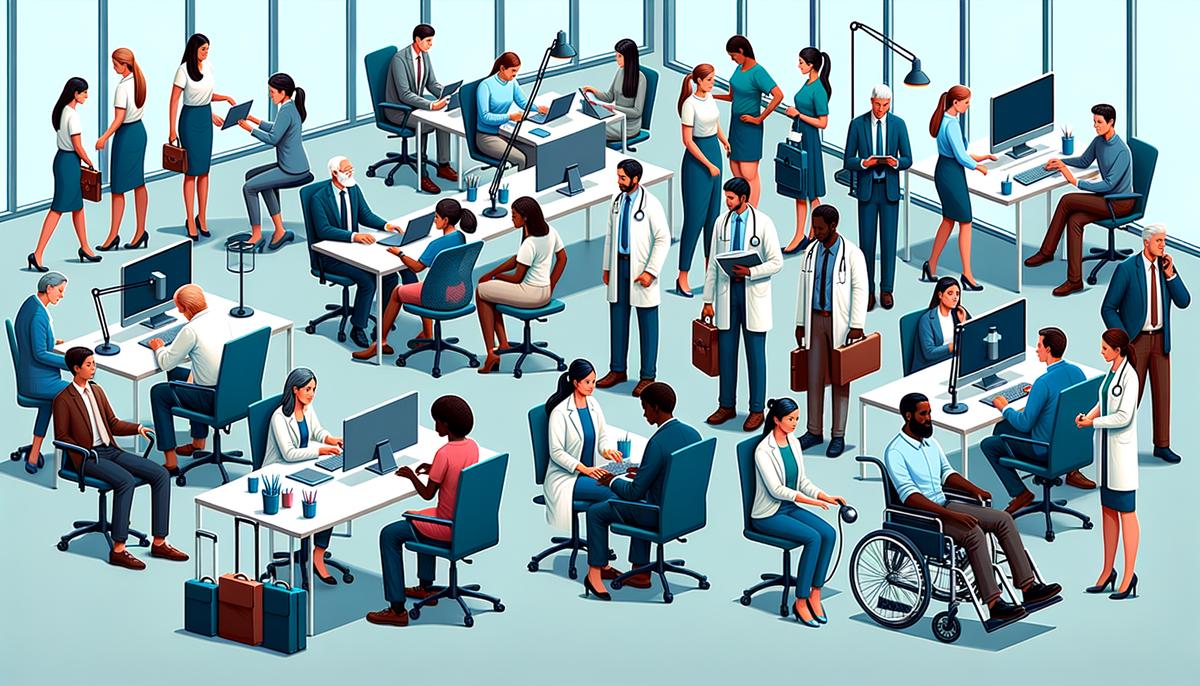
UK Sick Workers Economic Impact
Rise in Long-Term Sickness
The UK has seen a significant increase in people not working due to long-term sickness, with over two and a half million individuals affected. A major factor is the rise in mental health problems, particularly among younger people. Stress, depression, and anxiety may be leading more individuals to step back from work for extended periods.
Back and neck pain have also emerged as significant contributors. With more people working from home, improper office setups and prolonged sitting could be impacting physical health. These musculoskeletal issues suggest that new work environments may not be as ergonomic as they should be.
The rise in post-viral fatigue, highlighted by conditions such as long COVID, is another concerning trend. These ailments leave individuals feeling perpetually fatigued, further sidelining them from their duties. The ongoing struggle with managing and understanding post-viral syndromes adds complexity to this problem.
Economic statistics reveal that for every 13 people working, there is now one person out on long-term sickness.1 This poses a challenge to those directly affected and significantly impacts the UK’s economy and workforce dynamics.
Integrating these individuals back into the labor market is crucial. Strategies focus on adapting health benefit structures and implementing more supportive universal credit systems. However, the journey toward inclusion is gradual, balancing recovery and economic contribution.
Addressing workplace well-being is an important part of the solution, from ergonomic assessments for remote workers to mental health support initiatives. Personal stories underscore the need for a supportive approach, such as individuals having to quit their jobs due to back problems or taking time off for newly diagnosed health conditions.
The statistics provide insight into how delayed access to treatments and increased stress levels may be exacerbating the situation.2 Implementing preventive measures, encouraging regular movement breaks, and promoting a culture that values health could help change the landscape.
Amid these challenges, individuals can take steps, such as setting up an ergonomic workspace at home and seeking professional help at the onset of symptoms. However, creating a healthier future for the workforce depends on collective efforts, spanning from government policies to employer practices and individual awareness.

Economic Consequences
The rising trend of long-term sickness in the UK presents complex economic implications, impacting workforce participation, labor market tightness, and the challenge of filling job vacancies. This situation goes beyond absenteeism; it could hinder economic growth and influence inflation.
As fewer people participate in the workforce, the labor market becomes tighter. Employers struggle to find available talent, with over a million job vacancies remaining unfilled.3 This difficulty in steering the economy back to its pre-pandemic strength is a testament to the challenges faced.
In a tight labor market, the laws of supply and demand come into play. With a reduced pool of available workers, wages are driven upwards as employers compete to attract talent. While this may seem beneficial for workers, it can lead to inflation if wages rise faster than productivity, eroding the purchasing power of these higher paychecks.
The effects of increased long-term sickness extend to broader economic realms, affecting the balance between growth and inflation. Economic growth may slow down if a significant portion of the workforce is trapped in long-term sickness. This sluggish growth, combined with rising wages, creates a precarious situation for inflation.
Growth, which is key to economic vitality, becomes hindered. Businesses struggle to expand without sufficient labor power, innovation slows, and overall productivity declines. Meanwhile, inflation thrives in conditions where wage demands outpace productivity gains. The government and policymakers face the complex task of stimulating growth while keeping inflation in check.
Addressing the surge in long-term sickness requires a comprehensive strategy that combines healthcare intervention with inclusive and supportive economic policies. Improving workplaces to prioritize health, ensuring timely medical interventions, and fostering a flexible and resilient labor market could be transformative.
Employers can adopt more empathetic employment practices, while the government plays a crucial role in developing nuanced health and economic policies. Investing in public health strategies and creating a framework for people to return to work without fear of relapse or discrimination could jumpstart recovery. This multi-faceted approach aims to reshape the future working landscape, prioritizing both health and economic prosperity.
The rising tide of long-term sickness carries profound economic implications, from constraining workforce participation to influencing inflationary pressures. Navigating these challenges requires foresight, adaptability, and a commitment to integrating wellness into economic growth strategies. Only then can the UK hope to fully rebound, building an economy that nurtures both its GDP and the well-being of its workforce.

Government and Policy Response
The British government has initiated a multi-faceted approach to tackle the rising challenge of long-term sickness within its workforce. This strategy includes adjustments to health-related benefits, amendments to universal credit, and techniques to replenish the workforce.
The government has spearheaded efforts to alleviate the strain on those affected by long-term illnesses. Policy shifts include adjustments to health-related benefits, making them more considerate and accessible. These changes recognize the balance between sustaining economic vitality and fostering individual well-being.
Universal credit has also undergone changes, incorporating flexibility and compassion. These changes provide support to individuals grappling with health impediments and create a pathway for their eventual return to the workforce, promoting inclusivity and recovery.
The government has also implemented strategies to counteract workforce shortages. Plans are in place to recalibrate benefit schemes, enticing potential participants hindered by health issues. Professional rehabilitation and support networks offer skills refreshment and assurance, aiming to reintroduce sidelined talents and overcome barriers.
Broader structural changes, such as incentivizing employers through fiscal stimuli and legislation, encourage the welcoming of those returning from sickness. The goal is to create a workplace that welcomes the influx of refreshed talent, supported by government initiatives and an ethos of inclusivity.
Active engagement is crucial for the success of these initiatives, not only from those they aim to assist but also from commerce, community organizations, and healthcare providers. The impact of these governmental undertakings relies on collective effort, with agencies and industries aligning with the government’s vision of a Britain where long-term sickness no longer serves as an insurmountable barrier to personal fulfillment and economic contribution.
Through policy remodeling, benefit adjustments, and a commitment to bridging the gap between health and employment, governmental strategies aim to guide individuals back to the realms of work, dignity, and economic stability.
In concert with the nation’s resolve to address long-term illness in the workforce, governmental initiatives act as a support system. Embracing the future, these efforts offer hope and anchor a belief in the resurgence of Britain’s economy – a journey of revival steered by policy, perseverance, and the collective will of its people.

Preventive Measures and Workplace Adjustments
In an era where long-term sickness poses a significant threat, prevention becomes a crucial strategy that deserves diligent attention.
Ergonomic adjustments play a key role in staving off ill-health, particularly skeletal complaints and stress-related maladies. Adjustable workstations that align with the body’s needs can help prevent the onset of debilitating discomfort.
Prevention also involves work-life balance. Flexible working allows time and place to adapt to the demands of health and mental well-being. Rigid schedules give way to fluidity, championing productivity that complements the individual’s rhythm. Flexible schedules, remote work options, and the recognition of mental health days are integral to a more supportive workplace culture.
Employers have an important role in navigating these reforms. Their responsibility is to ensure that employees navigate their working lives without being impacted by avoidable ailments. Investment in comprehensive health insurance schemes signals support, making help readily accessible. Fostering an environment that encourages regular check-ins on employees’ physical and mental health reflects organizational empathy.
As caretakers, employers champion occupational health services—an often underplayed aspect of workplace well-being. Ensuring access to these services helps with prevention, with each occupational health advisory stemming the tide of potential long-term incapacitations.
This approach extends beyond ergonomic adjustments or employer support; it thrives in an ecosystem enriched by systemic empathy and pervasive health literacy. Cultivating a society that encourages and facilitates healthy lifestyle choices outlines a resilient future in the face of long-term sickness.
Focusing on prevention and thoughtful accommodation fosters resilience. Through careful planning, empathetic employment practices, and a commitment to health, we can build protection against the challenges posed by long-term illness. Each ergonomic chair designed to prevent back pain, each flexible hour offered for well-being, and each employer’s dedication to comprehensive health support contributes to the defense against long-term sickness—a testament to human ingenuity and compassion in the enduring quest for a healthier tomorrow.

- Office for National Statistics. Sickness absence in the UK labour market: 2021. Published online March 15, 2022.
- Chartered Institute of Personnel and Development. Health and wellbeing at work 2022. Published online March 31, 2022.
- Office for National Statistics. Vacancies and jobs in the UK: June 2023. Published online June 13, 2023.

Share
Facebook
X
LinkedIn
Telegram
Tumblr
WhatsApp
VK
Mail